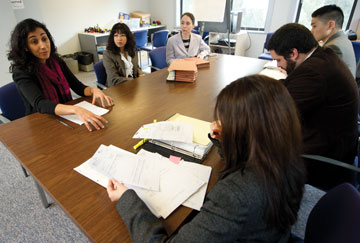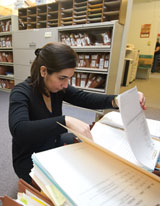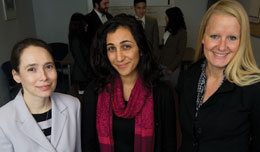Volume 28 · Number 3 · Spring 2011
Immigration ER
A School of Law clinic puts students in the forefront of the immigration debate, with real-world cases that determine whether clients stay or go—and sometimes change the law.
In a country cottage on the UC Davis campus, sandwiched between the arboretum and a parking lot, anxious visitors come nearly every day to pour out their life stories to concerned lawyers and students, hoping against hope that the good listeners will hear enough to help prevent these would-be clients from being booted out of America.

Supervising attorneys and students use role playing to sharpen their arguments for a deportation hearing in San Francisco. Clockwise from left: supervising attorney Raha Jorjani, playing the judge's role; student Tiffany Bui; clinic director Amagda Pérez and students Kyle Morishita, Matthew Quin Hodges; and, presenting the client's case, Anel Carrasco. The students later won the case, ending a 10-year legal battle for their client. (Karin Higgins/UC Davis)
The cottage is home to UC Davis law school's quarter century-old Immigration Law Clinic or, what Raha Jorjani calls, "the ER of the immigration world," a triage center for people in dire need of legal advice. "Our clients have already been tagged by immigration as people who should be removed from the U.S.," says Jorjani, one of three supervising attorneys at the law clinic.
The offices are cluttered, full of files and filing cabinets, the walls plastered with posters. By appearance, this could be one of a thousand civil rights law firms, peopled by idealistic young students, earnest rather than opulent, inherently low-key. This is the side of lawyering that doesn't make practitioners rich.
For the King Hall students who staff the clinic, the rewards are decidedly nonmonetary. "I came to Davis because of their social justice program," says 25-year-old law student Elica Vafaie, who has spent two years working anywhere from five to 40 hours per week at the clinic. "The immigration law clinic does a lot of really cutting-edge work. What we learn as students is really unquantifiable. It's been the best thing I've done in law school."
The students know they will end up "having a major part of someone's life in their hands," says Jorjani. And they understand that the stakes are huge: Win a case, and a family can stay together, in the U.S., in the homes they have created for themselves over years, even decades; lose a case, and all of that is gone. "It's also a political education," explains Jorjani. "They're witnessing firsthand the most devastating effects and impacts of our immigration system."
Around the country, many law schools have immigration clinics, and some of those clinics put students to work representing immigrants slated for deportation. Stanford University has strong clinics working on detention and immigration issues. UC Berkeley has an asylum clinic. Harvard has one that works on immigration issues, and in recent years several other universities around the country have also set up clinics that in some ways touch on immigration issues: Arizona State University runs one for immigration detention, and at the University of Texas, students work with family members of detainees. An innovative immigration clinic is also getting off the ground at the University of New Mexico.
But few clinics emphasize the critical intersection between immigration and criminal law, and the need to challenge unlawful and prolonged detention in the way that the UC Davis Immigration Law Clinic does. And, since noncitizen immigrants (both documented and undocumented) now risk deportation following a criminal conviction, that's an increasingly important combination of skills for young lawyers to develop.
"It gives us a legitimacy when we go before any court to know we're coming from a law school where one of the academic focuses is immigration law," asserts Holly Cooper, the associate director of the law clinic.
Over the past four decades, the incarcerated population of the United States has more than quadrupled, with more than 2 million people now living in the nation's jails and prisons. And, more recently, immigration, control of the border and the situation of the country's estimated 12 million undocumented migrants, have emerged as among the most contentious of modern policy issues. In California and other states along the Mexican border, the nexus of high incarceration rates and immigration has created a potent new set of social and legal problems to navigate, primarily due to a 15-year-old federal law that provides for the deportation of noncitizen immigrants who are in the country legally, if they have criminal convictions on their record. While not all crimes qualify a person for deportation, enough now do so that it has become a major concern for immigration lawyers: People who grew up in America but never applied for citizenship are being deported to countries around the world, to places they do not know and the languages of which they often do not speak.
As a result, the work done by the UC Davis Immigration Law Clinic — and funded on an annual shoestring budget in the half million dollar range, through a combination of grants from the state Department of Education and the California State Trust Fund Program, law school money and donations from alumni — is as topical as any legal work experience offered students anywhere in the country.
In addition to representing clients in court, clinic staff and students hold naturalization workshops up and down California's Central Valley — in churches, community centers, union halls and the like — talking to people who are in the country legally about how to apply for U.S. citizenship so as to avoid the risk of deportation down the road.
"It really is one of the centerpieces of the law school," Dean Kevin Johnson says. "It symbolizes our commitment to social justice and public service in a real, concrete, hands-on way." In any given semester, 30 to 35 students are enrolled in the clinic, making it one of the more popular and competitive of the law school's four clinics.

Student Elica Vafaie says the Immigration Law Clinic has given her the chance to argue law at a high level and make a difference in clients' lives. (Karin Higgins/UC Davis)
Law students working under the tutelage of Jorjani, Cooper and director Amagda Peréz, as well as a temporary fellow attached to the program for 18 months, take on complex immigration cases. Many involve clients charged with criminal offenses who are facing possible prison time and deportation; in some cases, families face separation, with adults being deported and children remaining in the U.S. Or, conversely, grown children who have lived in the U.S. most of their lives without citizenship protection, risk being deported with their parents staying behind. A good number of the criminal cases involve clients suffering from serious mental illness.
Sometimes judges, uncomfortable with the imbalances in power that are played out in courtrooms when unrepresented, impoverished defendants go up against prosecutors and federal Immigration and Customs Enforcement attorneys, will call the clinic and ask them to help clients, especially mentally ill individuals, who can't adequately represent themselves. Other times, clients who have heard about the clinic from fellow prisoners make contact themselves. And on still other occasions, the staff attorneys are drawn to a case because they believe it presents an opportunity to change case law. In a given year, the clinic's attorneys and students will take on more than 50 cases.
The clinic's second- and third-year student participants meet with families, take depositions and even argue before the U.S. Court of Appeals for the Ninth Circuit, based in San Francisco. Jorjani supervises students working on litigation; Peréz works more on asylum, cancellation of removal and family unity cases; and Cooper works at the intersection of immigration law and criminal defense.
"The immigration clinic brings to students an idea of practicing on the ground what they're learning in the classroom," explains Leticia Saucedo, director of clinical legal education. "It adds an experiential element that's crucial for the future of law schools. It's giving students a vision for their own responsibility as lawyers. This is one of the most sophisticated immigration law clinics in the country."
Says Dan Torres, an alumnus of the program who graduated in 2002, said, "it helped me focus my career goals, and gave me concrete, practicable skills in client interviewing, and in litigation. Right away, I was involved in an asylum case that went to the Ninth Circuit Court of Appeals. It really had an impact on me." Torres currently works for Proyecto Poderoso (Project Powerful) in Stockton, a partnership of California Rural Legal Assistance and the National Center for Lesbian Rights to improve legal services to low-income lesbian, gay, bisexual and transgender people in rural California.
Elica Vafaie, who plans to work on discrimination cases for a nonprofit firm in San Francisco after she completes her law degree this spring, agrees. The clinic, she says, has provided her with an opportunity to argue law at a high level and to see the nonmonetary fruits of victory. She recalls one case, in particular, where she succeeded in getting a refugee, who had been detained for two years, released. "Knowing what it meant for him and his family," she explains, "was an incredible feeling."
For the supervising attorneys, working on immigration issues is more than just a way of making money; it's something that resonates with them personally.
Jorjani was born in Tehran, Iran. A few years later, her family moved to the United States, settling in the Bay Area. A decade later, in high school, she got involved in immigrant rights work and also started spending time dealing with the problems faced by incarcerated people. The two issues, increasingly intertwined in California and other states, and disproportionately affecting impoverished people and people of color, rapidly developed into lifelong passions for her.
At law school at the City University of New York, Jorjani worked with prisoners. Afterward, she moved west, to Florence, Ariz., a burgeoning prison town in the saguaro-studded desert of central Arizona, to work with detained immigrants in the sprawling detention holding facility there. (Her senior colleague at the Florence Project was Holly Cooper, who also would later end up at the UC Davis immigration law clinic.) Jorjani worked long hours in the desert heat, in a state becoming increasingly hostile to immigrants, trying to work out how to aid the men and women locked up and awaiting deportation. "I came to immigration law from a criminal justice and prisoners rights background. Deportation defense allows me to work with incarcerated people and to advocate on behalf of some of the most marginalized people in our society." Then, a job opened up at the UC Davis Immigration Law Clinic, and Jorjani returned to California.

Immigration Law Clinic supervising attorneys Amagda Peréz,Raha Jorjani and Holly Cooper. (Karin Higgins/UC Davis)
When the clinic's director, Amagda Peréz — herself the child of immigrants who came to California from Mexico — was a youngster, she lived in the little agricultural hub of Kelseyville in Lake County. Her family resided on a ranch that harvested pears and wine grapes. During the summers, they all worked in a pear-packing facility. Peréz still remembers the U.S. Border Patrol coming into Kelseyville. Peréz and her parents were in the country legally, but the images of seasonal undocumented workers fleeing deep into the orchard affected her profoundly. "I wanted to do something to help people not to live in fear of being separated from the home they'd created in the United States," she said. "For me, for children to be separated from their parents was unimaginable."
Even as an undergraduate at UC Davis, she'd return to Kelseyville during the summers to work at the pear-packing plant. Later at the law school, Peréz spent her summers working with agricultural laborers, helping them get legal residency status.
Peréz '88, J.D. '91, says that she chose UC Davis law school at least in part because it had an immigration law clinic that had an excellent reputation for working on cutting-edge issues. In theory, she worked 16 to 20 hours a week at the clinic, to garner four credits per semester (unlike the rest of the Davis campus, the law school operates on a semester system). In practice, the hours were often longer. Some of the cases were emotionally all-consuming. One time, she worked with a number of clients who had been tortured by the military junta in Guatemala. "We were interviewing them for asylum applications and for a class action against [junta leader] General Hector Gramajo. I interviewed the named plaintiff, a very young man who had just experienced the most horrific…" She trails off. "It's hard to describe. During our interview it was the first time he'd ever told his story. It was very emotional for him. Personally, it was a hard interview for me to do."
After getting her law degree, Peréz worked with California Rural Legal Assistance for a few years before being asked to come back to the immigration clinic as a staff attorney. It was, she says, an opportunity to work on "some of the most challenging cases," the sort of resource-intensive cases many clinics shy away from. "We're trying cases where there are constitutional issues, criminal defense issues, human rights issues. To research all of that takes a lot of time. In an academic year, we might have eight to 10 removal hearings, requiring hundreds of hours of research — on country conditions, challenges to removability, changes in the law, and so on; multiple hearings in front of judges."
For Holly Cooper, who grew up in the northwest Texas town of Lubbock and now lives a few miles from Davis in the town of Woodland with her husband and two young kids, the work continually reminds her of how polarized the country is on immigration issues. "It's such a hot-ticket item. I don't think I have a day in my life where I don't have to defend what I do. I understand the imperfections of human nature. A lot of the individuals we're defending have been here the majority of their lives and made a mistake. A lot of the crimes are crimes of poverty. A lot of [the clients are] veterans, returning from Iraq." Deporting these people, she says, simply because they have, say, a drug addiction doesn't make much sense. "They are not accounting for his wife, their four children who are depending on him for support."
For the immigration clinic attorneys, getting their students to understand what these cases mean to the individual clients is as satisfying a teaching experience as any they can recall. "We take a lot of pride in the fact that a lot of the students, many of them graduates from the program, maintain some kind of tie to this work," Peréz declares. "They say it's one of the best learning opportunities at law school."
